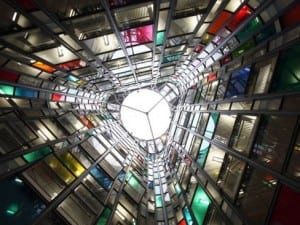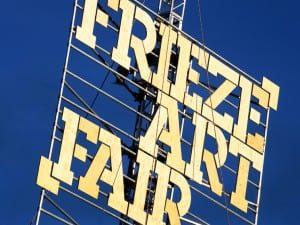In An Incomplete History of Protest, Whitney Museum, New York, explores its collection and archive with a focus on activism and politics. In the work of the socially engaged artists featured, art is a process with the power to enact direct and indirect change in the world. The wide date-range of the show allows for a diverse selection of global concerns to emerge, including protests against the Vietnam War, such as in the work of Nancy Spero and Edward Kleinholz, protests aimed at the governments’ response to the AIDS crisis, such as in the work of AA Bronson, General Idea, and Felix Gonzalez-Torres.
Some of the most surprising works are in the strand entitled Spaces and Predicaments, where sculptures by Melvin Edwards and Senga Nengudi suggest a more lyrical, enigmatic and diffuse approach to exploring protest in art. Nengudi’s Internal I (1977), which creates a hopeful space and seems to draw on the tree of life, is being displayed in the gallery for the first time. The history of feminist art is also bound with an evolving aesthetics of protest, and this is represented in the work of artists including Guerrilla Girls, Howardena Pindell, Martha Rosler, and Mierle Laderman Ukeles. “Since its founding in the early 20th century, the Whitney has served as a forum for the most urgent art and ideas of the day, at times itself attracting protest,” said Scott Rothkopf, the Whitney’s Deputy Director for Programs and Nancy and Steve Crown Family Chief Curator. “From questions of representation to the fight for civil rights, An Incomplete History of Protest foregrounds issues that still incite protest today. At the root of this exhibition is the belief that artists play a profound role in transforming their time and shaping the future.”
The title of the show has an extra resonance in the light of recent unrest in Charlottesville. The exhibition looks at the ways in which artists have responded to racialised violence, through works by Hock E Aye Vi Edgar Heap of Birds, Carl Pope, Pat Ward Williams. These confrontational and powerful works are particularly relevant to understanding the contemporary context of race and violence in the USA. Other artists included are Mark Bradford, Paul Chan, Larry Clark, On Kawara, Glenn Ligon, Julie Mehretu, Toyo Miyatake, Senga Nengudi, Gordon Parks, Ad Reinhardt, Martha Rosler, and Kara Walker. The affirming aspect of this exhibition is in the diversity of approaches the featured artists take to making transformative, world-changing work.
An Incomplete History of Protest runs from 18 August. For more information: www.whitney.org.
Credits:
1. Toyo Miyatake (1895–1979), Untitled (Opening Image from Valediction), 1944. Gelatin silver print mounted on board, 9 7/16 x 7 5/16 in. (24 x 18.6 cm). Whitney Museum of American Art, New York; purchase with funds from the Photography Committee 2014.243 © Toyo Miyatake Studio.





